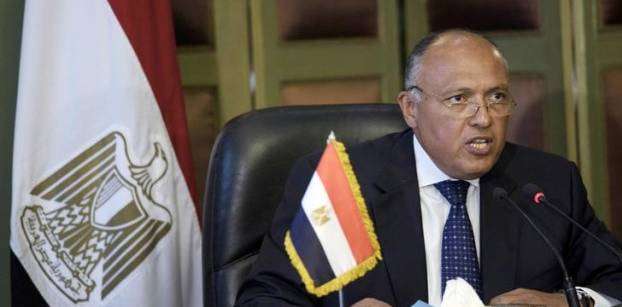Egyptian foreign minister sees Trump’s divisive policies to ‘evolve’ over time

Egyptian Foreign Minister Sameh Shoukry during a press conference with Secretary of State John Kerry in Cairo on Aug. 2, 2015 - Reuters
CAIRO, Dec 7 (Aswat Masriya) - As the world braces for the coming U.S. president, Egypt’s foreign minister Sameh Shoukry began a visit to Washington earlier this month to discuss bilateral relations and meet with the new Administration’s transitional team.
Shoukry weighed in on U.S. President-elect Donald Trump and Egyptian-U.S. bilateral relations in a television interview aired Tuesday night on CNN.
“We are always interested in developing and enhancing the relationship,” Shoukry said when host Wolf Blitzer asked about the state of Egyptian-U.S. bilateral relations.
“The relationship has always been one where it is valuable to both sides and we have extracted benefit and so has the U.S.”
Blitzer asked Shoukry about the prospects of Egyptian-U.S. ties under a Trump presidency amid controversial issues like the proposed “Muslim ban”.
Regarding the "Muslim ban", Shoukry said that “there wasn’t a discussion of such a specific nature," with Vice President-elect Mike Pence.
“I can’t say that there was a violent reaction to the statement," Shoukry said, adding that there was a desire that any policy would be undertaken "with care and consideration that any form of racial profiling is not in tune with the international community’s understanding of human rights.”
“We do not traditionally interfere in how societies organise or legislate related to their internal affairs.”
However, Shoukry held the view that Trump’s ideas and controversial proposals would “develop and continue to evolve as the policy apparatus is put in place.”
Trump previously called for a ban on Muslims entering the US, enraging many inside and outside the US. The president elect has been known for his racially charged rhetoric, putting many Muslims, Latinos and African Americans in a state of worry.
Following his election, the statement calling for the ban was removed from his website.
The foreign minister also stated that Egypt was not mentioned among the countries with a “history of terrorism” that could face policies like a “temporary ban” or “vetting” in line with Trump’s proposed policies.
Shoukry had interjected Blizter at the beginning of the interview to challenge the host’s prelude in reference to the June 30 events, arguing that it was not a “coup”, but “a popular uprising by the Egyptian people.”
“The military did not organise it, this was the 30 million Egyptians, among them myself when I was retired, that took to the streets,” Shoukry said, “And it was the military that protected them and forged the political roadmap with the participation of all political dimensions of Egypt and decided to depose Mursi.”
Shoukry’s remarks on the June 30 mass protests that led to the military overthrow of former president Mohamed Mursi echo numerous foreign ministry statements that incessantly refuted labeling those events as a “military coup”.
On Syria, Shoukry stated that Egypt has been “heavily involved in trying to alleviate the humanitarian difficulties that exist.”
Egypt, Spain and New Zealand drafted a Security Council resolution that would have demanded a seven-day ceasefire in Aleppo and humanitarian aid access. However, it did not pass due to Russian and Chinese vetoes.
Shoukry stated that there has been consultation with the Syrian opposition from the Egyptian side and dismissed a military solution to the conflict.
“The Syrian opposition and the Syrian people deserve the opportunity to take matters in their own hands and forge the future of Syria within a political peaceful process…this is the UN representative and the international community’s responsibility to protect the people.”
The foreign minister concluded his visit to Washington on Tuesday with intensive meetings with a number of members of the House of Representatives and the US Senate, before heading to New York to meet with the new United Nations secretary-general, Antonio Guterres, the ministry’s spokesperson said.
The meetings focused on providing a “comprehensive overview of the developments on the economic, social and political fronts in Egypt, and the various components of economic and social reform program.”
Shoukry met with Secretary of State John Kerry on the first day of his visit and signed a bilateral memorandum of understanding concerning the imposition of import restrictions on archaeological material of Egypt.
He also met with Vice President-elect Mike Pence and the Managing Director of the International Monetary Fund (IMF), Christine Lagarde.
Egypt received a $12 billion three-year loan from the IMF in November.









facebook comments